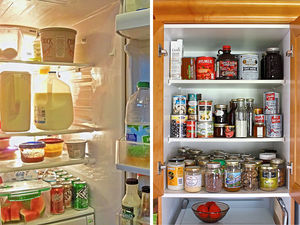Fridge or cupboard? Where do you store your ketchup, butter and eggs?
Ketchup. How do you like yours? Supermarket giant Asda recently asked customers of one of its London stores how they liked their tomato sauce to be stored.

And because they’re a bit funny about that kind of thing down there – they said they wanted their red sauce stored the way they like their champagne – chilled.
The move has sparked an debate about what food should be kept where. Here, a series of experts give their views.
Ketchup
Top chef Chris Burt, who keeps The Peach Tree restaurant in Shrewsbury, is right behind the Asda shoppers in London. “Ketchup should definitely be kept in the fridge, to keep it in good condition,” he says. “Old ketchup, which has been left at room temperature is not good.”
For many, the idea of dipping your chips in cold sauce might take a bit of getting used to, but Peter Barratt of Initial Hygiene says there is good reason for the change in approach to ketchup maintenance. “No one kept tomato ketchup in the fridge a decade ago, but then it contained more salt,” he says.
But Mr Barratt says in recent years food manufacturers have reduced the salt content because of its links to high blood pressure and other health issues. But a lack of salt means ketchup is prone to decay, particularly at temperatures above 16C (61F) where bacteria which can cause food poisoning will thrive. However, that does not apply to the supermarket shelves. It’s fine to keep unopened bottles in the cupboard because the seal on the lid stops germs getting inside.
Butter
Surely this should be kept in the fridge? Apparently not. Mr Burt says it is fine to leave butter in a sealed container for a day or two. “Butter is made from milk, but it won’t go bad if it is out of the fridge for a couple of days,” he says. “Keeping it out of the fridge makes it easier to spread.”
The cream used to make butter is pasteurised, which repels bacteria and lengthens its shelf life. It’s also about 80 per cent fat which combined with a low water content makes it less prone to bacterial growth. He says butter is generally used quite quickly, so leaving it in the cupboard shouldn’t be a problem. But anything more than a few days is not a good idea, and it will quickly go rancid.
Eggs
Like with butter, it depends how long you intend to keep them. But unless you plan to use them quickly, it is best to keep them in the fridge.
For Mr Burt, this is not a problem. “As an egg producer myself, I would not refrigerate,” he says. “I’m going to use then very quickly on a breakfast or in baking, and I don’t like using cold eggs, they are definitely not good for baking. But if you use eggs infrequently, definitely pop them in the fridge.” The biggest risk is salmonella, which causes about 2,500 hospital admissions a year in Britain. That said, most eggs in this country now come from vaccinated flocks, so the risk is low. Heath Arnfield, cookery tutor at City of Wolverhampton College, adds: “Eggs are laid, stored, transported and sold at ambient temperatures, so why put them in the fridge ? “Ambient is cooler than warm. Follow the best before date next to the red lion and you won’t go wrong.”
Fresh herbs
Mr Burt says he grows most of his own herbs, but if he does buy or forage them he tries to ensure they do not get too cool. “I will wrap them in a damp Jay Cloth and place them in a sealed cool box, as the temperature never gets too low and it lasts longer,” he says. Most domestic fridges are full of condensation, and the the water can turn the leaves slimy and light.
Chocolate
Chocolate should never be kept in the fridge, not even in hot weather. And this doesn’t just apply to ordinary bars, but also to biscuits truffles and sweets, although there are some exceptions, such as wafers and chocolates with cream fillings.,
Refrigerating chocolate can lead to “sugar bloom”, which occurs when it’s chilled then exposed to warmer air. It causes condensation on the surface, dissolving some of the sugar, which recrystallises as a grainy, white coating. Chocolate also absorbs odours, so there’s a risk it will end up smelling – and tasting – of whatever else is in your fridge. Which is not great if you keep tomatoes in there.
Tomatoes
Not that you should be keeping tomatoes in the fridge, mind. Mr Burt says tomato skins become tougher if they are refrigerated, and the delicate flavours of the fruit, which tend to grow best in hot countries, are best preserved at room temperature.
A balance of sugars, acids and compounds known as volatiles are responsible for everything from texture to aroma. Placing them in the fridge causes these volatiles to disintegrate, as well as slowing down the natural ripening process, which makes them red and juicy.
Mr Arnfield adds: “Tomatoes are a fruit so pop them in the fruit basket and let them ripen along with the rest of the fruit. In a British climate they will never get that hot but in a heatwave refrigerate them before using in a salad.”
Berries and grapes
These have high water content, and need to be kept cool, as at room temperature they will lose moisture and tend to shrivel up. Food technologist Brian Smith says keeping them in the fridge will keep them crisp, and lock in the moisture to ensure they stay juicy.
Mr Arnfield agrees: “Berries should go straight into the fridge and be consumed within five days,” he says. However, Mr Burt warns against letting them get too cold, and has his own way of keeping them in top condition. “I keep them in a sealed cool box outside,” he says. “If they get too cold you will lose the flavour.”
Bread
Though many people think it makes it last longer, putting bread in the fridge dries it out and causes it to go stale faster, as the the low temperature sucks the moisture out.
That said, if you are planning to keep it for a while, by all means put it in the freezer, where it can be stored for up to three months.
Sub-freezing temperatures can stop the growth of mould, returning it to an almost fresh condition when defrosted.
Potatoes
Potatoes are what pantries are made for. While they are best kept cool and dry, they should never be refrigerated.
Mr Arnfield, of City of Wolverhampton College, says: “Take them out of the plastic bag they came in and store them loose in a cool, dry environment, if possible in the dark. Discard them at the first sign of an eye or softness.”
Joanna Abishegam-David of the Food Standards Agency also warns that storing raw potatoes in the fridge may lead to the formation of free sugars. This can increase overall levels of acrylamide, a chemical that has been linked with an increased risk of cancer, she warns. Acrylamide is further increased if you fry, roast or bake potatoes.
Apples
While you will rarely see apples in the fridge in the supermarket, this is the best place to keep them. As they ripen, they give off ethylene gas, which is a natural compound that makes nearby fruit and veg ripen – and eventually rot.
Storing them in the fridge slows the production of ethylene, making them last longer.
Coffee
Instant coffee is difficult to store, as its granules attract moisture that will damage its taste and aroma. It is best kept in the cupboard to avoid the build up of condensation in the jar.
Mr Arnfield says: “Ground coffee should be kept in an air tight container away from strong sunlight as it will deteriorate and alter the taste. Some people keep it in the fridge but, again, make sure its in an air tight container.”
Onions, root vegetables and garlic
Garlic will go mouldy in the fridge, while onions will make other food smell. A dry, dark cupboard will prevent these from sprouting, a process which is caused by exposure to light. Ideally store them in separate bags or boxes in the cupboard.
Peanut butter
Peanut butter tends to be made from all-natural ingredients – peanuts, oil and a sugar or salt – so it is best kept in the cupboard.
Mr Barratt of Initial Hygiene says: “As it’s not packed with preservatives, the peanut butter could start to degrade, ruining the product and risking tummy upsets.
However, this is unlikely to be a cause for concern if it is used within three months of opening.”
Jam, marmalade and other preserves
Contrary to what many people think, these should never be kept in the fridge.
Food technologist Brian Smith says if they become too cold, condensation in the jar creates the perfect environment for bacteria to germinate.
The high fruit content of jam and marmalade makes them naturally acidic, inhibiting bacterial growth.
Marmite
Some people love it, others hate it. But experts agree that it should never be kept in the fridge.
High in salt, which acts as a natural preservative, it will last several years before going off. However refrigerating it, even in squeezy tubes, will result in it becoming rock hard and impossible to spread.
If it has been hanging around in the cupboard for a long time, a quick sniff should tell you whether it’s still okay to eat.
Pickle, chutney or mustard
These tend to contain less sugar than preserves and less salt than Marmite, so pickles, chutneys and mustard are safer in the fridge — particularly once opened.
If in doubt, read the instructions, as some may be safe at room temperature.
But home-made pickles and chutneys are susceptible to mould as the jars haven’t been professionally sealed. Again, best kept in the fridge.
Salad dressing/mayonnaise
These are high in fresh eggs and cream, meaning that despite the acidic lemon juice, they will go off if not kept in the fridge.
Cheese
While butter tends to be used quite quickly, cheese tends to be kept for longer, and really does need to go in the fridge.
Mr Arnfield, from City of Wolverhampton College, advises keeping cheese in a plastic container so it won’t absorb smells from other foodstuffs in the fridge.
“Before using take it out of the packet and let it breathe,” he says.
“Some cheeses release more flavour if left out for 30 minutes before using.”
Cheeses are prone to going off because they are high in protein, which acts as an energy source for bacteria to grow.
Soft cheeses such as mozzarella and goat’s cheese have the shortest shelf life because, in addition to the protein, they have low levels of salt.
Medium cheeses such as cheddar, edam and gruyere are also best kept in the fridge, as the cold locks in acidity and flavour.
Hard cheeses — such as parmesan and manchego — may be stored out of the fridge, as they have a low moisture content and, therefore, are less likely to decay.
However once a cheese has been unwrapped or cut, it is exposed to micro-organisms in the air and should be refrigerated.
Bananas, avocados and citrus fruit
Like tomatoes, these fruits are grown in hot climates and are not used to the cold.
If kept in the fridge, the ripening enzymes of avocados are inhibited. This, in turn, leads to other enzymes thriving, causing cell damage and blackening the skin,
Mr Burt recommends keeping bananas, avocados and citrus fruit in a cool, but not cold, cupboard, where they can ripen at a normal pace.
Mr Arnfield adds: “Some fruits need to fully ripen before consumption and if you place them in the fridge before they fully ripen they can be tasteless. The life of limes, lemons and oranges will be extended by up to three weeks if kept in a fridge.”
Wine
John Melhuish, fine wine manager at Tanners in Shrewsbury, says ideally a bottle of wine should always be finished in one sitting.
However, if you do have some left over, it is best to keep it in the fridge to prevent it from deteriorating.
Exposure to oxygen causes wines to decay, slowly turning into vinegar, but keeping it corked, upright and cold minimises this.
“You can also get devices which draw the air out of the bottle, but like a lot of stuff it will last a little longer in the fridge,” he says.
“You don’t really want to drink it at fridge temperature, you will probably want to let it warm up a little bit first.



